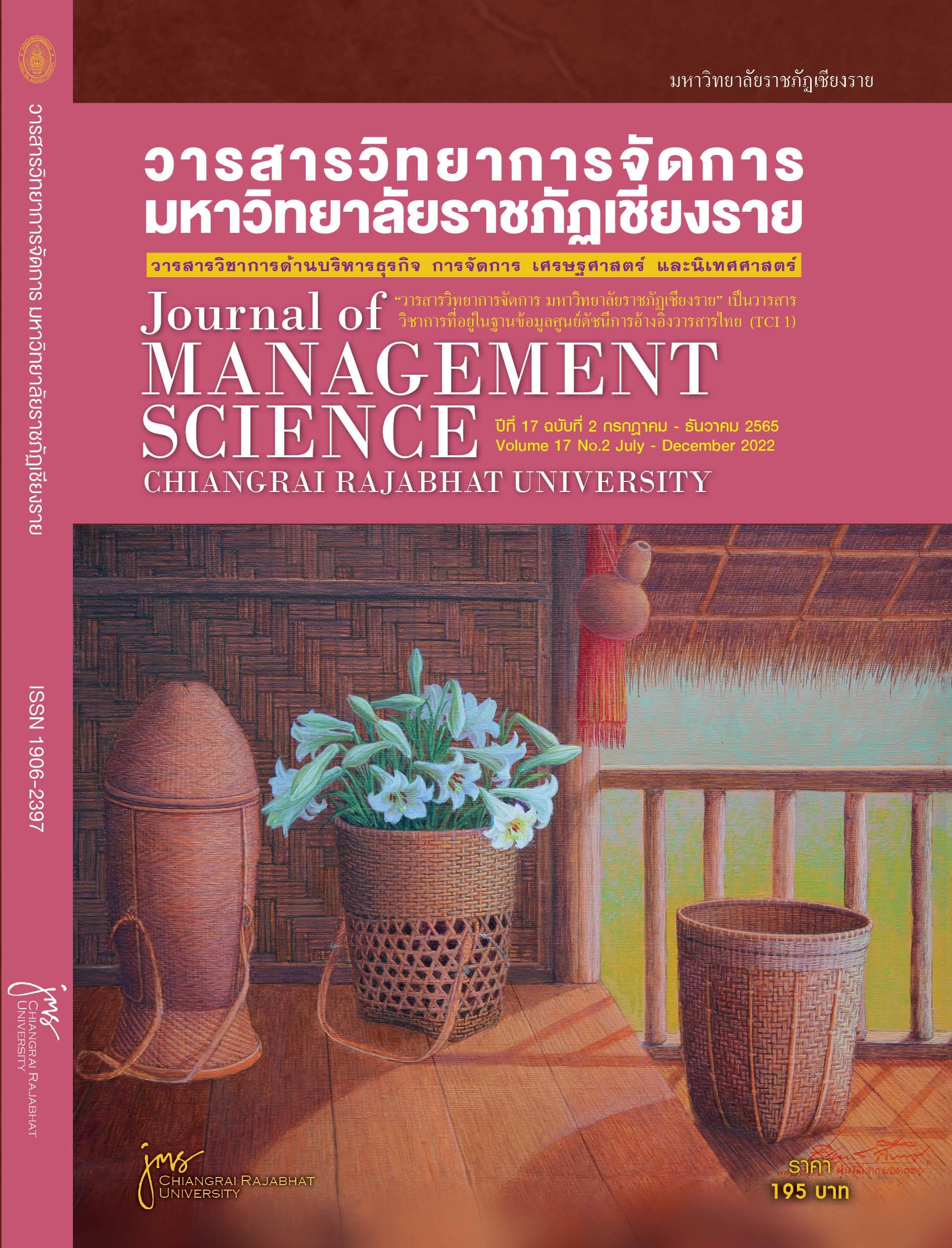A Study Model of the Factors of Gen x People Affecting Purchase Confidence Online via Digital Platform
Main Article Content
Abstract
Gen X people are in the working age and have high income, so online shopping is important for their daily life and tends to increase. The purpose of this research was to examine the factors of Gen X people that affected their confidence in online purchases through digital platforms. Conduct quantitative research that surveyed quantitative data from 222 Gen X digital platform users, using descriptive, reference, and multiple statistics in data analysis. The results of the analysis of the developed structural equation model revealed that passed the assessment criteria were consistent with the empirical data. The probability chi-square was 0.065 (p-value =0.065), the relative chi-square was 1.325 (CMIN/DF=1.325), the conformance index was 0.954 (GFI=0.954), and the root mean square of the error estimation was 0.038 (RMSEA=0.038). with significant level of 0.001 conformed to regulation. For the analysis of variables within the newly developed model, it was found that the components of System have highest direct influence on Performance with a weighted influence curve of 0.93, followed by Performance components, which have direct influence on Worthiness with a weighted influence curve of 0.91, System components have direct influence on Trust with a weighted influence curve of 0.57, and Worthiness components have direct influence Trust with a weighted influence curve of 0.56, respectively.
Article Details

This work is licensed under a Creative Commons Attribution-NonCommercial-NoDerivatives 4.0 International License.
Views and opinions expressed in the journal do not necessarily reflect those of the editors.
References
Arbuckle, J. L. (2016). AMOS 20.0 users guide. Crawfordville, FL: Amos Development Corporation.
Chang, H. H., & Chen, S. W. (2009). Consumer perception of interface quality, security, and loyalty in electronic commerce. Information & Management. 46, 411-417.
Comrey, A. L., & Lee, H. B. (2016). A First Course in Factor Analysis. 2nd ed. New York : Psychology Press.
De Matos, C. A., Curth, M., & Dos Santos Garcia, A. (2020). Customer loyalty in the online context : Understanding trust in different parties. Journal of Electronic Commerce Research. 21(4), 237-251.
Editorial Department TCIJ. (2022). Survey reveals that Thai people have the highest online shopping rate in the world during COVID-19. Retrieved August 25, 2021, From https://www.tcijthai.com/ news/2021/19/scoop/11763
Electronic Transactions Development Agency. (2021). Pointing out sales channels: online shopping channels The most popular with the opportunity that the seller should not miss. Retrieved August 25, 2021, from https://www. etda.or.th/th/KnowledgeSharing/eCommerce/ThailandeCommerceplatform.2020.aspx.
Hair, J. F., Black, W. C., Babin, B. J., & Anderson, R. E. (2010). Multivariate Data Analysis. 7th ed. NJ : Pearson Education International.
Hsiu-Fen Lin & Gwo-Hshiung Tzeng. (2014). Contextual factors affecting knowledge management diffusion in SMEs. Industrial Management & Data Systems, 114(9), 1415-1437.
Lewicski, R. J., McAllister, D. J., & Bries, R. J. (1998). Trust and distrust : New Relationships and Realities. Academy of Management Review, 23, 438-458.
Ministry of Digital Economy and Society. (2020). Thailand Internet User Behavior 2020. Bangkok : Strategy Bureau Electronic Transactions Development Agency Ministry of Digital Economy and Society. (in Thai).
Nunnally, J. C. (1978). Psychometric theory. New York : McGraw.
Parasuraman, A., Zeithaml, Valerie A. & Berry, Leonard, L. (1985). A conceptual model of service quality and its implications for future research. Journal of Marketing, 49(3), 41-50.
Plachai, Daruwan & Srisornkamphon, Palida. (2018). Behavior in Visiting and Tracking 3 Brand Websites : Lazada TH, Shopee TH and 11Street TH of the Population in Bangkok. Graduate Studies Journal : Suan Sunandha Rajabhat University, 2(1), 61-68. (in Thai).
Rattapreechacha, Kanokwan & Parncharoen, Charunya. (2022). Trust Affecting Online Consumer Loyalty In Bangkok Metropolitan Region. Suthiparithat Journal, 35(4), 25-41. (in Thai).
Rovinelli, R. J., & Hambleton, R. K. (1977). On the use of content specialists in the assessment of criterion referenced test item validity. Dutch Journal of Educational Research, 2(2), 49-60.
Silpcharu, Thanin. (2017). Statistical research and analysis with SPSS and AMOS. 15th ed. Bangkok : Business R&D. (in Thai).
Tabachnick, B. G., & Fidell, L. S. (2007). Using Multivariate Statistics. 5th ed. New York : Allyn and Bacon.
Thirakovatkajorn, Kriengsak & Tularuk, Woradul. (2020). New Forms of Platform Mediated Work for On-demand Food Delivery. Bangkok : Friedrich Ebert Stiftung foundation Printing. (in Thai).
Watts, S. (2020). Digital Platforms : A Brief Introduction. Retrieved April 1, 2021, From https://www.bmc.com/blogs/digital-platforms/


